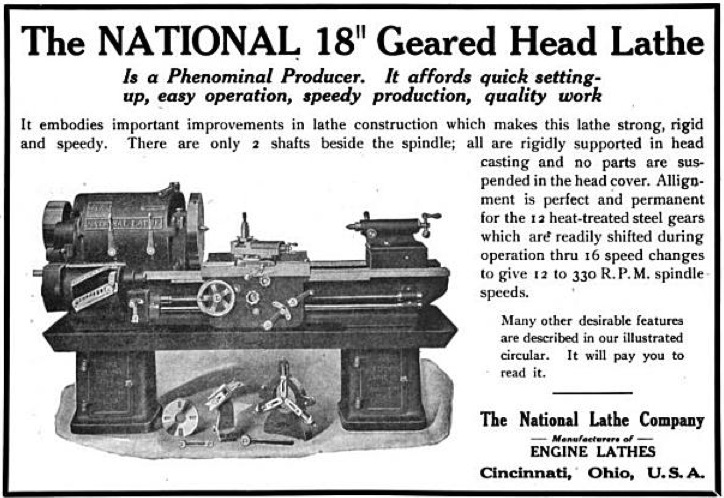This firm was established in 1913 in Batavia, Ohio. By 1917 they had relocated to Cincinnati. The business failed in early 1923 or '24.
One of the principals of this firm, Mr. Arthur V. Carroll, had already established the Carroll & Jamieson Machine Tool Co., a business that seems to have been active at the same time as National Lathe. Even before the business failure of National Lathe, he established A. V. Carroll Machine Tool Co. The December 14, 1922 issue of American Machinist had side-by-side ads for both Carroll & Jamieson and A. V. Carroll, so it would seem that all three businesses were active at the same time.

Ad from July 1918 "Commercial America"
Information Sources
- The May 22, 1913 issue of Iron Age has this news item:
The National Lathe Company, Batavia, Ohio, has been incorporated with $10,000 capital stock to manufacture lathes and other machine tools. The incorporators are A. V. Carroll, John F. Hartman and Augustus Carrier.
- The 1916 edition of Norfolk and Western Railway Industrial and Shippers Guide lists National Lathe Company of Bativia, Ohio, as a lathe maker.
- The July 1917 Machinery has an illustrated article on this firm's 18" gear-head lathe, and 17" cone-driven engine lathe. The lathes are heavily and simply built. The company was in Cincinnati.
- A poster to the Practical Machinist forum describes a lathe marked as "National Lathe Company, Batavia, Ohio".
- The July 1918 issue of Commercial America featured a 1/3 page ad from this firm, located in Cincinnati.
- A 1923 or '24 issue of Automotive Industries had this snippet:
NATIONAL LATHE RECEIVERSHIP CINCINNATI, Jan. 10—Upon application of Charles Reedy, president and treasurer of the National Lathe Co., manufacturer of engine lathes, Paul Stewart has been appointed receiver for the company by the Common ... which, if disposed of in the regular course of business will net a substantial profit, and that its assets are about $20,000 in excess of liabilities. Inability to convert those assets into money, slow collections, and lack of sufficient were given as the causes of Reedy's actions.